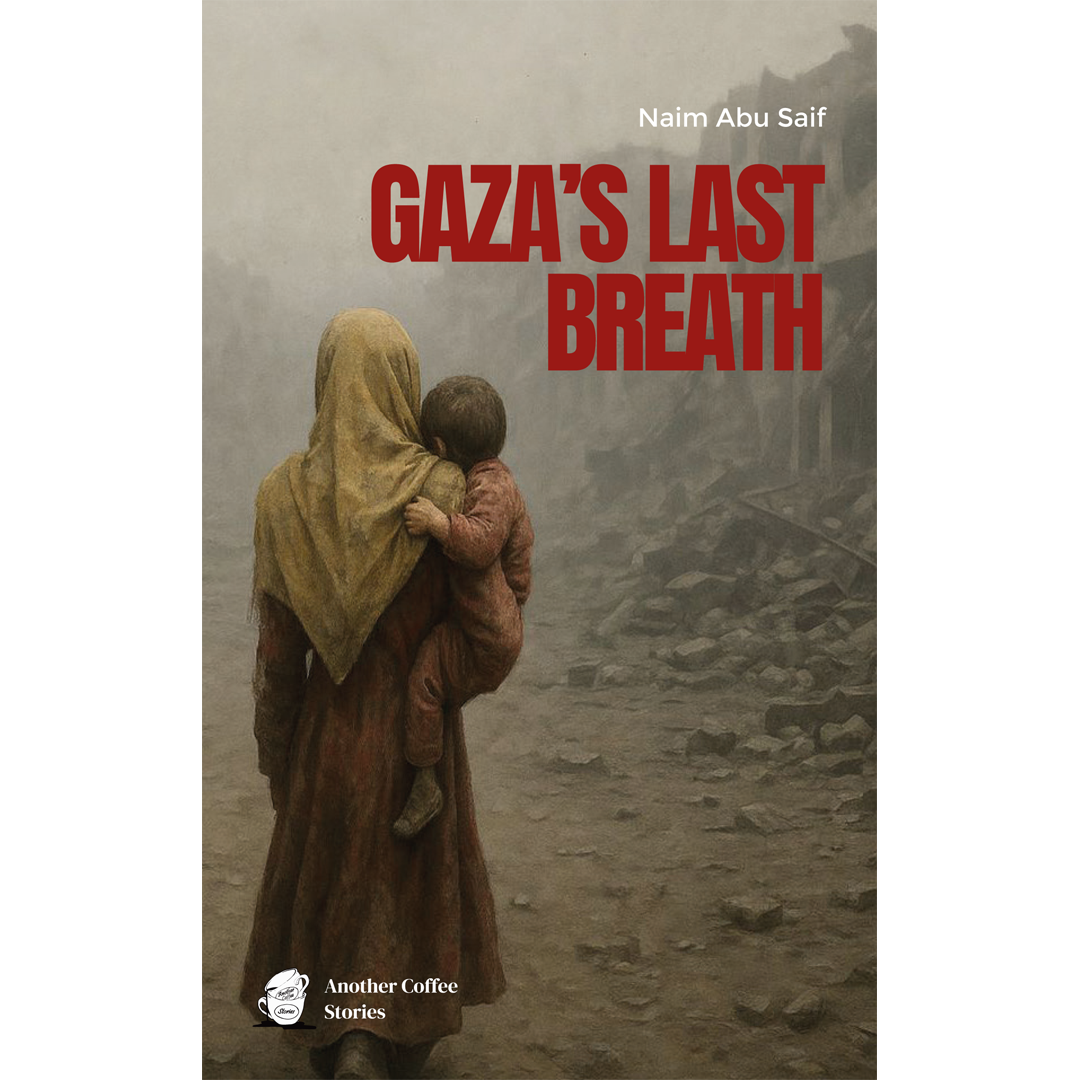Another Coffee Stories Editore
GAZA'S LAST BREATH
GAZA'S LAST BREATH
Impossibile caricare la disponibilità di ritiro
Author: Naim Abu Saif
Pages: 166
Genre: Historical novel, introspective, biography
Publication date: 07/06/2025
ISBN: 9791280451749
ALL PROCEEDS FROM THE BOOK WILL BE DONATED ENTIRELY TO NAIM
Foreword by publisher Anna Giada Altomare
It is important to read this book.
It is important to read this book, then to be able to agree or disagree, praise it or criticize it, appreciate it in part or see yourself fully reflected in it.
What matters is being able to read it.
What matters is being able to express your opinion.
Because Naim is alive.
This book exists because Naim Abu Saif is alive.
Alive to tell. Alive to bear witness. Alive to write.
Gaza’s Last Breath is a human document.
Not a political statement, nor an ideological declaration: it is the lived testimony of a young journalist from Gaza, a twenty-two-year-old boy who found in the written word his only space for survival.
This is his story. It is the story of his family. It is the story of their violated humanity.
As a publishing house, and as a woman, I believe in one principle above all: humanity cannot be selective.
Humanity is either whole or it is not.
And it is in the name of this humanity that we declare our absolute and irrevocable condemnation of all forms of genocide, of all forms of apartheid, of all forms of war.
Our editorial commitment stems from the moral duty to shine light where darkness reigns.
But also from a legal duty that we cannot and must not forget.
Humanity has already known horror, and swore it would never happen again.
It did so through concrete tools.
The Universal Declaration of Human Rights, adopted on December 10, 1948, states in Article 1 that “all human beings are born free and equal in dignity and rights.”
Article 3 guarantees every individual “the right to life, liberty, and security of person.”
The Convention on the Prevention and Punishment of the Crime of Genocide, also adopted in 1948, defines in Article II genocide as “any act committed with intent to destroy, in whole or in part, a national, ethnical, racial or religious group.”
The Fourth Geneva Convention, signed in 1949 and ratified by nearly all countries in the world, protects civilians in times of war and explicitly prohibits, in Articles 33 and 147, collective punishments, indiscriminate bombings, and attacks against non-combatants.
The Hague Conventions, the 1977 Additional Protocols to humanitarian law, and the Rome Statute of the International Criminal Court (1998): all these instruments converge on one fundamental point — deliberately targeting civilians, health facilities, humanitarian workers, and homes is a war crime.
Finally, Article 1 of the United Nations Charter affirms the fundamental duty of member states to “promote and encourage respect for human rights and for fundamental freedoms for all without distinction as to race, sex, language, or religion.”
And yet, all of this is violated every day in Gaza.
The words written in these treaties remain a dead letter, while the civilian population is bombed, starved, dehumanized.
While the world, in large part, stays silent.
This book wants to break that silence.
It seeks to make space for a voice that is often ignored or censored.
Not to tell us what to think, but to invite us to think.
To ask you to listen to yourselves, deeply.
To read.
To feel.
What kind of humanity do we want to be?
Do we want to be the kind that selects which suffering is acceptable and which is not?
The kind that legitimizes the death of children and students in the name of geopolitics?
Or do we want to be a humanity capable of stopping, recognizing, responding, and caring?
We, as a publishing house, have made our choice.
We believe that every human being has the right to tell their truth.
We believe that every story deserves to be read.
We believe that every people has the right to life, to freedom, and to dignity.
Because without these rights, there is no justice.
And without justice, there is no peace.
We dedicate this book to Naim’s family, and especially to his father, who passed on to him the love of words and the strength to resist.
May this book be testimony.
May this book be memory.
May this book be an act of humanity.
Because where there is the written word, where there is a book, there is always hope.
Anna Giada Altomare
Founder and publisher of Another Coffee Stories
SYNOPSIS
Naim Abu Saif is a 22-year-old writer from the north of the Gaza Strip, who was training to become a journalist before October 7, 2023. His life is marked by deep loss and unimaginable pain. He lost his home, his father, and most of his family, finding himself displaced and alone in a war zone. His story reflects the anguish of countless Gazan families enduring the horrors of genocide.
Through writing, he gives voice to those silenced, shedding light on the untold stories of Gaza’s families.
His words are a testimony of survival, loss, and resilience, born from the ashes of an unthinkable tragedy.
Paired coffee: Caffè Ernani – Kalledevarapura


